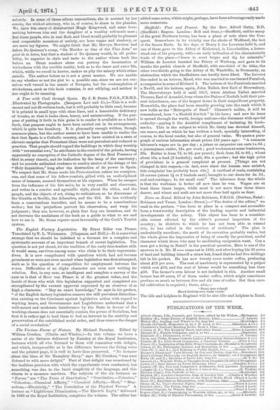Sheffield: Past and Present. By the Rev. Alfred 'Getty, D.D.
(Sheffield : Rogers. London : Boll and Sons.)—Sheffield, :unlike many of the great Northern towns, has been a place of note since the Con- quest. Somewhere in its vicinity was the abode of Waltheof, the last of the Saxon Earls. In the days of Henry L the Lovetots held it, and one of them gave to the Abbey of Kirkstead, in Lincolnshire, a home- stead out of his property, with—an early indication of the characteristic trade of the place—" leave to erect forges and dig for minerals." William de Lovetot founded the Priory of Worksop, and gave to its monks the parish church of Sheffield, with one-third of its tithe, the other two-thirds going to the Abbey of St. Wandrille, in Normandy, an abstraction which the Sheffielders can hardly have liked. The Lovetot line ended in an heiress, Maud, who was married to one Gerard Furnival, a companion in arms of Richard L The heiress of the Furnivala married a Nevill, and his heiress, again, John Talbot, first Earl of Shrewsbury. The Shrewsburys held it until 1617, when Alethoa Talbot married Thomas, Earl of Arundel, from whom the Dukes of Norfolk hold their pre- sent inheritance, one of the largest items in their magnificent property. Meanwhile, the place had been steadily growing into the rank which it now holds as the "Metropolis of Steel." Chaucer's miller, it will be remembered, bore "a Shefeld thwitch " in his hose ; and now its fame is spread through the world, foreign nations—the Germans with special audacity—paying it the doubtful compliment of imitating its trade- marks. This is the subject to which Mr. Getty has devoted himself, con amore, and on which he has written a book, specially interesting, of course, to the local reader, but also of general value. We quote a para- graph of curious information about prices 110 years ago: "A common labourer's wages are Is. per day ; a joiner or carpenter can earn la 6d. ; a journeyman cutler, 12s. per week ; good workmenat some businesses, 20s. Batter is from 7d. to 9d. per pound; flesh from 3d. to Ad. ; wheat about 16s. a load (3 bushels); malt, 40s. a quarter ; but the high price of provisions is a general complaint at present. [Things are not changed in this reapeek—in fact, ever since the human race existed, this complaint has probably been rife.] A cartload of coals, containing 10 corves (about l or 2 bushels each) brought to our doors for 5s. 2d., coal and carriage ; 4s. for small coal." The inference from the whole is that the workman is better off now than be was. Wages are at least three times larger, while meat is not more than three times dearer, and wheat and malt are not more than half again as dear.


































 Previous page
Previous page